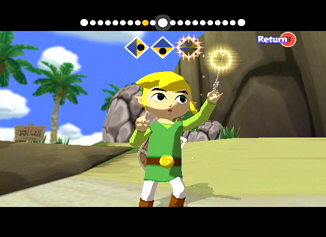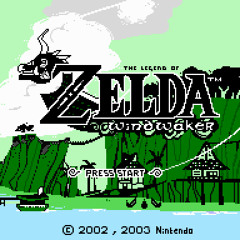

This adaptation of the Zelda legacy, while bringing new life to it, grounds the game as a myth. This song adapts the classic and strips it down to the core, while also adding a fresh layer to the harmony.

This song is emblematic of the musical tone and theme of the game.

Probably the greatest piece in this score (and my favorite) is “The Legendary Hero.” It is an acoustic, stripped down version of the above mentioned “Overworld Theme,” while blending in a new harmony and additions to the melody 11. Again, these fan favorites and songs carry nostalgia while also bringing thematic unity to the game.

There is even a reimagining of the title screen music from A Link to the Past that makes its way into the game 10. The “Master Sword,” “Cave,” and “House” themes are borrowed wholesale from Ocarina of Time, with new arrangements on the “Zelda” and “Fairy Spring” themes 9. The Wind Waker also borrows songs from Ocarina of Time (as it takes place 100 years after the events of that game) and A Link to the Past 8.
#ALL WIND WAKER SONGS SERIES#
The “Overworld Theme,” also known as the “Hyrule Field Theme” exists in every single game in the main series 7, and is repurposed in The Wind Waker as the “Great Sea Theme.” Even with the changes in the environment, this installment still adapts the classic theme. And since each game is part of a larger mythical world, the primary musical theme evolves but remains the same. With his understanding of motifs: unity, and the stickiness of music, Kondo has been able to leave a lasting legacy of good music within the series 6, which has a history of maintaining a singular message and pattern within the music.Īs discussed in the previous chapter, this game series is about exploration of a fantasy world. The creative mind behind the music for Zelda has been Koji Kondo, a man who has also shaped video game music through his gift of the Super Mario Bros. In particular, I enjoy the Ocarina of Time, Wind Waker, and Twilight Princess soundtracks, which served as creative inspiration while writing this book. There are two selections of game music that I listen to regularly, Metroid Prime and the Zelda games. Across the series, the score is always a principle and outstanding element of each game. I’m going to refer to the soundtrack a lot, so if you don’t have access to a copy of it, do a quick Google search and listen to it as you read this chapter.Īs an iconic piece of pop culture, The Legend of Zelda series has memorable music. There are great songs, and good ones as well, and this chapter outlines some of the strengths of music as an important element of the game. While I wish these fanfares and jingles were excluded, this is still a great soundtrack 5. But even the “real” songs are rather short, leaving you to wonder if they could have been longer if the SFX were cut from the CD 4. Most of the tracks are short-merely jingles that represent different accomplishments in the game. What strikes me most about the soundtrack is its length: 133 tracks spread over 2 CDs. Listening to it countless times, I’ve also found other trends in the score. The motif of the Great Sea reflects this new direction, with a natural rhythm that mirrors the waves of the ocean. You can hear the natural ebbs and flows in the soundtrack, reflecting travel by boat 3. With Link no longer exploring on foot or horseback, the sea had an impact on the music. The new landscape of Hyrule also changed the musical landscape. With more composers working on the score, the themes and motifs were expertly crafted to build the tone of the game.īut improved sound cards and a larger compositional group were not the only changes to the Zelda formula with this game. While most games usually only have two or three composers, due to the rushed development schedule The Wind Waker had five to six 2. While some of the track fall flat, none of them sound intolerable.Īnother change in this game is the number of composers involved in the production. While it wasn’t technically fully orchestrated, the MIDI-based instruments sound much better than the N64 scores 1. One of these improvements included a drastically better sound card, allowing for improved music. Below is a chapter from my upcoming book, The Symbolism of Zelda: A Textual Analysis of The Wind Waker.īeing released on a new console-the GameCube-meant that The Wind Waker could take advantage of the new and improved hardware.


 0 kommentar(er)
0 kommentar(er)
